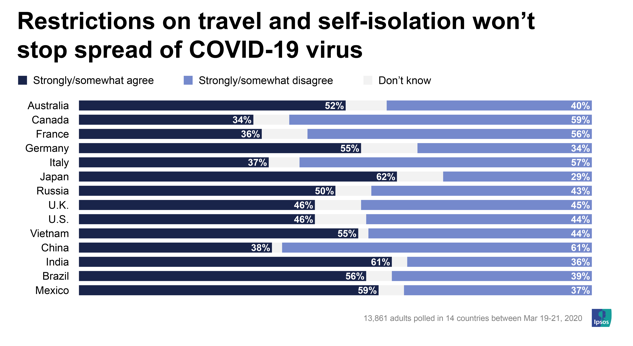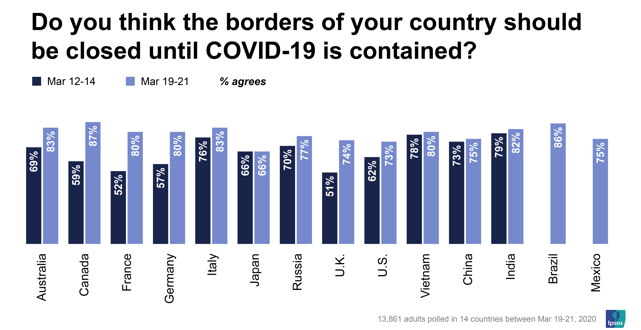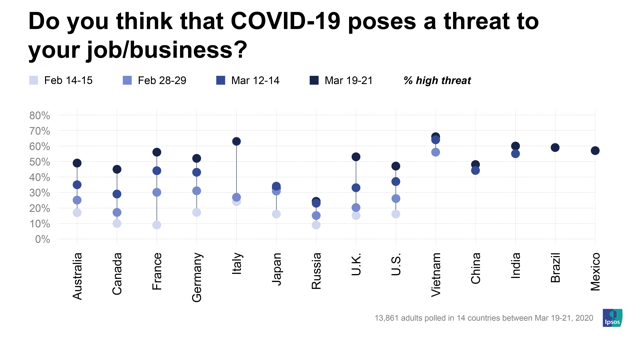More than half of people in many large countries think the restrictions on travel and mandates for self-isolation will not stop the spread of the coronavirus, according to the latest Ipsos survey.
In a poll of nearly 14,000 people conducted online March 19-21, majorities in eight out of the 14 countries surveyed agreed social distancing measures such as travel bans, and self-isolation will not prevent the spread of the virus. Majorities in Japan (62%), India (61%), Mexico (59%), Brazil (56%), Germany and Vietnam (55%), and Australia (52%) believe social distancing will not work, while majorities in countries like China (61%), Canada (59%), Italy (57%) and France (56%) disagree.
Darrell Bricker, CEO of Public Affairs, said the results show people are not confident that isolation, both personally and nationally, will stop the spread of the coronavirus.
“These findings help to explain why isolation isn’t being obeyed in some countries. We are divided on whether or not it works,” said Bricker.
In terms of what measures governments can do to try to limit the spread of the pandemic, there’s been an increase in all countries in the number of people who believe their country borders should be closed until the virus is proven to be contained.
The most significant increases are seen in Canada and France (+28), Germany and the U.K. (+23) and Australia (+14).

“While it might seem like a contradiction that we question whether isolation will stop the virus but still want closed borders, the public supports strong action from governments even if they might question its efficacy,” according to Bricker.
Impact on Health, Jobs
There’s also been a substantial jump in four of the countries in the number of people now believing an infection from the outbreak could have a very to extremely serious effect on their health, however, the figures remain low compared to the anticipated impact on jobs.
There’s been double-digit increases in this sentiment in the United States, the United Kingdom and Germany (+11 percentage points), and Canada (+10). However, Asia-Pacific countries are still the most worried about the health impact with about three in four people in China (77%), India (75%) and Vietnam (74%) believing the coronavirus could affect them very seriously. Surprisingly, Italy is the only country where there is actually a decline on this measure by 12 points to 26%.

At the same time, there’s also been a noticeable increase in the number of people who think the coronavirus poses a high threat to their job or business in all countries – with Italy being one of the few exceptions remaining unchanged at 63%. Meanwhile, Japan is the only country with a decrease – down two points to 32%.
The biggest jumps on this measure are all in developed economies of the U.K. (+20), Canada (+16), Australia (+14), France (+12), and the U.S. (+10). But, the country with the largest number of people worried about their jobs and businesses continues to be Vietnam (66%).

About the Study
These are the results of an Ipsos survey conducted March 19th to 21st, 2020 on the Global Advisor online platform among 14,000 adults aged 18-74 in Canada and the United States and 16-74 in Australia, China, France, Germany, Italy, India, Japan, Russia, Vietnam and the United Kingdom. Where available, tracking results from Wave 3, conducted February 28-29, February 14-15, and February 7-9 are presented. Sample sizes are consistent wave to wave.
The sample consists of approximately 1,000 individuals in each country. The samples in Australia, Canada, France, Germany, Italy, Japan, the U.K. and the U.S. can be taken as representative of these countries’ general adult population under the age of 75. The sample in China, India, Russia and Vietnam is more urban, more educated and/or more affluent than the general population and should be viewed as reflecting the views of the more “connected” segment of the population. The data is weighted so that each market’s sample composition best reflects the demographic profile of the adult population according to the most recent census data.
Where results do not sum to 100 or the ‘difference’ appears to be +/-1 more/less than the actual, this may be due to rounding, multiple responses or the exclusion of don’t knows or not stated responses. The precision of Ipsos online polls are calculated using a credibility interval with a poll of 1,000 accurate to +/- 3.5 percentage points. For more information on the Ipsos use of credibility intervals, please visit the Ipsos website (www.Ipsos.com).



















Add Comment